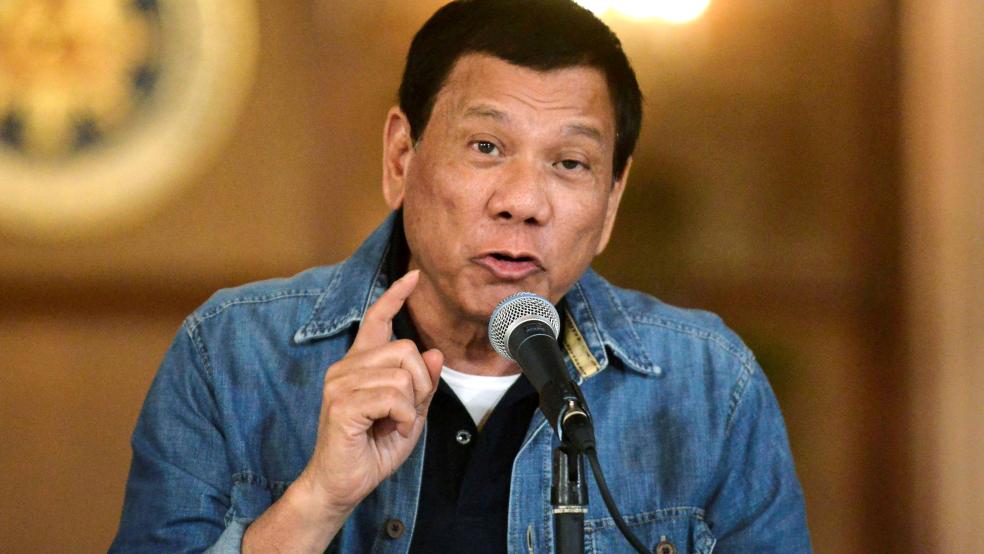President Trump is suddenly talking to a lot of the world’s “strongmen”—two in the past week—and proposing to talk to others. Should he be?
In most cases, the answer is an emphatic “Yes,” and this seems to be Trump’s thinking, too. He has been in regular contact with President Xi Jinping since their summit at Mar–a–Lago last month. (And the Chinese leader’s a strongman whether we like to think of him as one.)
Related: Trump Breaks Ice With China's Xi in Letter Seeking 'Constructive' Ties
Last weekend Trump had “a very friendly conversation,” as the White House put it, with Rodrigo Duterte of the Philippines. On Tuesday, he took a call from President Vladimir Putin —their first exchange since Trump authorized a cruise missile strike on a Syrian airfield last month. And let’s not forget Trump’s out-of-the-blue assertion this week that he’s willing to enter negotiations with Kim Jong-un, the North Korean leader, “under the right circumstances.” Like the exchanges with Putin and Duterte, this caused no shortage of controversy.
Why is Trump talking with Putin when Russia’s leader is accused of hacking email and meddling in last November’s elections? How can he talk to Duterte while the Filipino president continues a violent campaign against drug dealers and addicts? As to Kim, is there anything to discuss with an erratic leader intent on developing nuclear weapons and the missiles he needs to use them?
While human rights and other such concerns can’t be ignored, contact with foreign leaders depends on two judgments: Are open channels in U.S. interests, and are they the best way—or the only way—to resolving a conflict or crisis?
• Xi Jinping. Talking to Xi is essential. Frequent exchanges are especially important now because Trump wants to adjust trade and investment ties, discuss security questions in the South China Sea, which remain unresolved, and—most pressing— work with China to defuse tensions on the Korean Peninsula.
Related: Trump and Xi Play Good Cop-Bad Cop with North Korea
Team Trump’s now leaning heavily on Beijing to increase pressure on Pyongyang to halt its nuclear weapons and missile programs. The problem here is wishful thinking: China doesn’t want a nuclear-armed North Korea any more than the U.S. does, but the Trump White House consistently overestimates how much Xi can or will do.
• Kim Jong-un. Trump stunned everybody when he told Bloomberg News Monday that he’d talk to Kim “if it would be appropriate.” Striking another unconventional note, he called Kim “a smart cookie” and added, “I would be honored to do it.”
While the White House scrambled to soften Trump’s assertion, there’s nothing too crazy about it for two reasons. One, a summit with the North has been on the table before; Bill Clinton planned one with Kim Jong-il, Jong-un’s father, in late-2000 and canceled at the last minute citing time constraints. Two, as the Chinese reminded Trump Tuesday for the umpteenth time, “The only feasible way to a denuclearized Korean peninsula, as well as peace and stability there, is through dialogue and construction.”
Related: Trump’s Shocking Suggestion for What to Do About North Korea’s Kim Jong-un
• Rodrigo Duterte. The Filipino leader was quick to insult Washington and summit in Beijing after he took office a year ago, but he’s plainly a fence-sitter who knows how important the Philippines is to U.S. strategic interests. When Trump invited Duterte to Washington during their conversation last Sunday, he pointedly waffled, claiming obligations elsewhere.
At this point it’s down to raw competition: On Wednesday, three days after Trump’s call, Xi called Duterte to talk with “a friendly neighbor” and “an important partner,” as Chinese media described the exchange.
No matter who’s in power in Manila, it’s key to a successful resolution of the U.S.–Chinese rivalry in the South China Sea. This is the wrong time to leave Duterte hanging, shut him out, or sanction him for his domestic policies, repellent as these may be.
Related: Philippines' Duterte Says Chat With Xi Was at Trump's Request
• Vladimir Putin. While Trump long sought a rapprochement with Moscow, he said after the missile strike in Syria a month ago that relations “may be at an all-time low.” It’s hard to say what his telephone conversation with Putin Tuesday might lead to.
Some analysts say Obama’s refusal in September 2015 to work jointly with Russia against the Islamic State stands as a mistake second only to the 2003 invasion of Iraq. Trump may think so, too: He agreed Tuesday to send a representative to Russian-sponsored peace talks that have convened intermittently since January. He did so Wednesday for the current round, which ended Thursday in an agreement establishing “de-escalation zones.”
Syria’s one of two potential centerpieces in any revival of civility between Washington and Moscow. The other is a reboot of the “Minsk II” ceasefire agreement on Ukraine. That has been stalled for more than a year.
Trump seems to think there’s no resolving these and other problems without Moscow’s cooperation. He’s right. There are more good complaints to make about Putin than there are about Duterte, but the principle applies: Cutting the telephone lines does nobody any good. It’s in U.S. interests to keep on talking.






